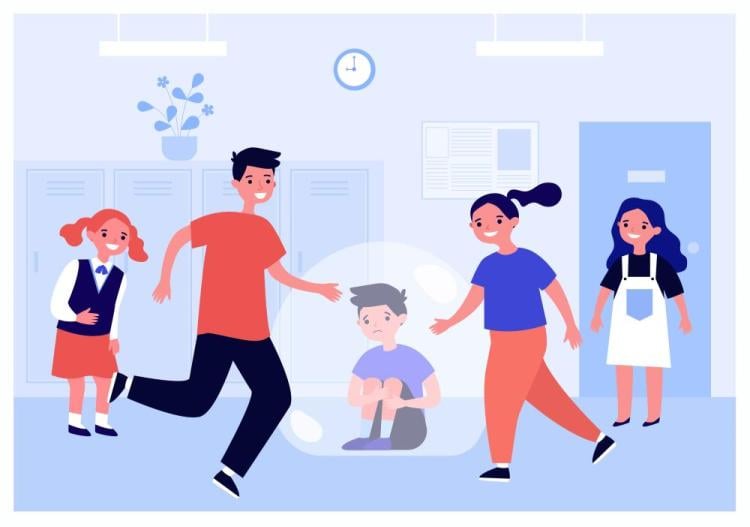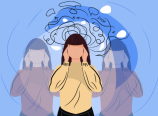School Anxiety: Signs and Strategies
School Anxiety: Signs and Strategies

The start of the school year means new routines, classmates, and teachers. While returning to school brings anticipation and excitement, many students struggle with worries and fears beyond what’s considered the first-day jitters.
Anxiety disorders affect approximately 32% of children between the ages of 13 and 18 years old. Research shows teens with untreated anxiety disorders are at higher risk for:
- Performing poorly in school
- Missing out on social events
- Engaging in substance use
What is Back-to-School Anxiety?
Anxiety is a normal emotion and something we all experience, usually in response to something stressful. It’s not dangerous, and usually passes quickly all by itself. Anxiety becomes a problem when our stress response is getting confused, believing there’s an actual danger or threat when there isn’t. This can cause a recurring cycle. If the stress response is activated too much, we continue to perceive something as dangerous which typically isn’t, and the anxiety response kicks in more often.
When it comes to the start of a new academic year, there’s a lot of anticipation and natural “what if” thoughts. What if I forget my lunch? What if I don’t have a place to sit on the bus? What if my locker is far away from my friends?
School anxiety is also connected to confidence. Whether they’re in first or twelfth grade, students may doubt their ability to manage their course load and socializing with peers.
School Anxiety Symptoms
For elementary-age children, anxiety can look like physical complaints, including stomachaches or headaches showing up on Sunday evening. Older kids may struggle with increased screentime, oversleeping, or being difficult to wake and get out the door in the morning. As the start of the school day approaches, children of any age may show signs of panic, like hyperventilating, nausea, or feeling faint. All are forms of avoidance and when frequently accommodated, can worsen school anxiety.
7 signs of anxiety in the classroom may include:
- Avoidance of academic and peer activities
- Frequent self-doubt and criticism
- Late or incomplete assignments
- Physical and verbal hyperactivity
- Seeking constant reassurance from the teacher
- Difficulty transitioning between school and home
- Poor concentration
How to Help with School Anxiety
Here are six back-to-school anxiety tips parents and caregivers can try:
- Be curious and seek to understand. Engage with your child in a way that is age appropriate. When children are young, get down on the floor and play with them at their level, asking questions through play characters instead of initiating a conversation like you would with an older child. Paint nails, shoot free throws, play catch, take the dog for a walk, or go for a car ride with your teen. Removing the pressure of direct eye contact can help a teen feel more comfortable engaging in difficult conversations. When we seek to understand, asking questions from a curiosity standpoint, we tend to get more input from kids.
- Share what you’re noticing and don’t assume. It could be what you think it is, but maybe it isn’t. After sharing your concerns, see what your child thinks about them.
- Validate emotions. A response could be something as simple as, “Thank you so much for sharing. It makes a lot of sense why you’re feeling anxious.”
- Try responding using the word “and” or “yet.” If your child says something like, “I can’t do this, it’s too hard,” you can respond by saying something like, “I know it’s hard, and let’s figure out ways to make it more manageable.” Adding “and” or “yet” helps balance a person’s thoughts and reinforces a growth mindset.
- Offer support, but be careful not to jump to solutions. Parents are fixers. We want to make things better, because then we feel better, too. Depending on a child’s age, what they need from us could look quite different. Ask children for their ideas of how they think they can navigate what they’re feeling. What have they tried so far? Then parents can assess if the child is handing it appropriately or whether they need to intervene.
- Consider sharing with the child’s school. It’s important to open the lines of communication and keep them open so that everyone is on the same page. Be sure to talk about what’s being done at home to help the child transition into school.
What to Do When Your Child has Anxiety About School
If you know your child tends to be anxious about a new school year, I recommend:
- Adjusting your child’s schedule. Two to three weeks before school begins, progressively resume a structured bedtime and morning routine. We know the importance of getting a good night’s sleep and it takes our bodies time to adjust.
- Infusing some fun into going back to school. I haven’t met a kid yet who doesn't enjoy back-to-school shopping. Whether it's finding that sparkly pen or a cute new pair of shoes, it doesn’t have to cost a lot of money.
- Preparing them socially. Ask, “Who are you looking forward to having lunch with?”, “How would you introduce yourself to someone new?” Maybe do some role playing. Encourage play dates prior to school. When kids feel connected, it helps their confidence, which in turn can help with anxiety.
- Exploring the new environment. Take advantage of an open house night to meet your child’s teacher, check out the locker, and walk the new schedule.
This blog was written by Rogers Behavioral Health, an ADAA partner.



















